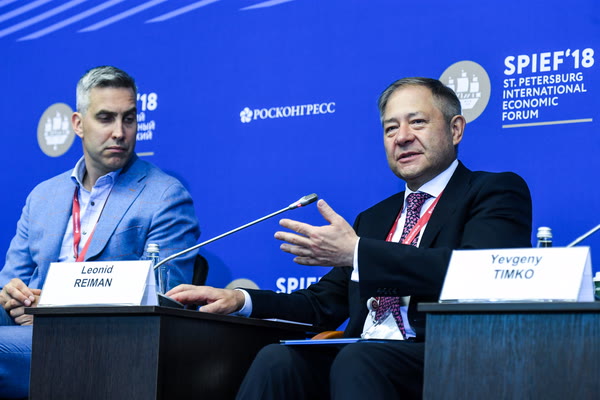
New Leaders in the Technology Sector: Entering the Global Market
KEY CONCLUSIONS
Government actively supports high tech industry
“In my opinion, there are two leading projects in the current policy of the Russian Federation, which target the qualitative growth of Russia’s technological advancement. The first project <…> is Digital Economy. <...> The second project, which is aimed at finding teams and projects in new technological areas, is the National Technological Initiative project,” Mikhail Antonov, Deputy General Director, Director for Innovative Infrastructure Development, RVC JSC.
“As part of our interaction with the Ministry of Trade, and the Russian Export Centre, we cooperate actively in a number of areas. That is useful, good practice,” Dmitry Shushkin, Chief Executive Officer, ABBYY Russia.
Demand for export of high-tech products is growing
“The export object itself becomes so high-tech that possibly rockets and tanks will be of no interest, but rather ones and zeros going across borders,” Kirill Kaem, Senior Vice-President for Innovations, Skolkovo Foundation.
“People, especially in mature economies, of course, primarily look at the value of what you offer. If it allows them to succeed, make some profit in business, they begin to want it from that moment on,” Dmitry Shushkin.
PROBLEMS
High-tech exports from Russia grow at slow pace
“Currently, high-tech exports from Russia amount to approximately USD 6,600 million. <...> That’s two times less than high-tech exports of Poland or India, or Hungary. That’s about 4 times less than the Philippines, 9 times less than Malaysia,” Elena Kuznetsova, Partner, McKinsey & Company.
Dependence of Russian businesses on imported equipment
“Technologies, from the standpoint of satellite equipment, unfortunately, arrive here, as before, mostly from abroad. <...> From the standpoint of payload, most of equipment, now much like in the past, comes from abroad. Indeed, the share is gradually falling,” Oleg Dukhovnitsky, Head of the Federal Communications Agency (Rossvyaz).
SOLUTIONS
Optimism and willingness to learn
"You have to be an optimist, to learn constantly. Not to be shy to learn from your rivals, or from your subordinates, and work skillfully as part of the team. Then everything will work out for us,” Oleg Dukhovnitsky.
“To enter the world markets, you need to be an optimist. Because if you don’t believe in what you do, you’ll never accomplish anything,” Leonid Reiman, Chairman of the Board of Directors, Angstrem PJSC.
Using advantages to create a competitive product
“You must try and be the best at what you do, not try to get a hold of everything, focus on where you can show top quality. And then, I think, it will be in demand everywhere,” Dmitry Shushkin.
“Our task is to create an industrial infrastructure, and based on that to try to find the exact product that would be in demand in the West,” Leonid Reiman.
Conquering stable positions in the local market
“Entering new markets, going abroad from our native country, from our native location, you need, first of all, to stay calm over having already taken a share in the local market, you have a financial cushion, so that you’ve reached some kind of stability here,” Alexander Khanin, General Director, VisionLabs.
“If you had no recognition or success in the local market, both in b2b and b2c, <...> then it makes no sense to go somewhere else,” Alexey Katkov, Managing Partner, Sistema.
Development of partner network
“No money or investment is enough to ensure local presence in all regions of interest. It is much more appropriate to do that with partners who know the local market, who already run projects,” Alexander Khanin.
Careful analysis of the market situation
“First, you need to understand whether it’s b2b or b2c. If it’s b2c, then find out whether there is a chance to make the best product and have the money for its promotion <...>. If it’s a b2b product, then understand how toxic this product is in the market, what possible downturn of the situation could happen,” Alexey Katkov.
Creating an efficient model of government regulation for high-tech industries
“The government should support its high-tech industries. The development of high-tech sector is a very important factor for the country's development. <...> In addition to traditional matters, such as financing and grants, other mechanisms are available too,” Leonid Reiman.
“In part of the projects related to, for example, microelectronics, biology, without creation of government platforms and investments into government platforms, which allow to provide the teams with basic conditions for development of their own products, we’ll be losing those teams, unfortunately,” Kirill Kaem.
Interaction of high-tech businesses and industrial manufacture
“One can’t say that the Russian industry somehow lags far behind. Working with it, basically, you can develop, achieve those competencies that will be in demand in the West,” Yevgeny Timko, Co-founder, Xploration Capital.
Engaging international businesses into Russian jurisdiction
“Some of the companies, some of the teams, some of the leaders will go to jurisdictions where they feel comfortable developing their projects and their products. But Russia should also become attractive for companies and teams that could develop their products here in Russia. Government regulations should contribute to that as well,” Mikhail Antonov.








